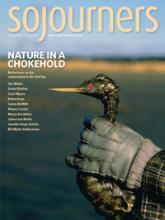We have devoted much energy to the discussion of the so-called “Genesis question,” which has to do with the relation between creation and evolution. But now we must find ways in which we can apply our orthodox beliefs concerning the creation of our first parents in God’s image and their subsequent rebellion against the Creator to an understanding of the heresies that lie at the roots of racism, sexism, militarism, and the exploitation of the natural order. Evangelicals have rightly talked much about the virgin birth of Christ, his deity, and his future return. But now we must also discuss the political and economic lifestyles and strategies that might be appropriate responses to his unique Lordship and Kingship ...
The fundamentalists have talked much about the “blood atonement,” an emphasis that liberals have often mocked, referring to it on occasion as a “slaughterhouse religion.” ... But my main criticism is not that they did too much with the substitutionary and transactional themes in the doctrine of the atonement, but that they did too little.
The payment that Jesus made through his shed blood was a larger payment than many fundamentalists have seemed to think. For even when they have sung the words with zeal, they have not seemed to acknowledge in their social/political lives that Jesus did, indeed, pay it all. He died to remove the stains of political corruption, and of all forms of human manipulation and exploitation. And he calls us to witness to and to enjoy the first fruits of that full redemption.
Richard Mouw was a professor of philosophy at Calvin College when this article appeared in the Post-American, the original Sojourners.
Read the Full Article

Already a subscriber? Login